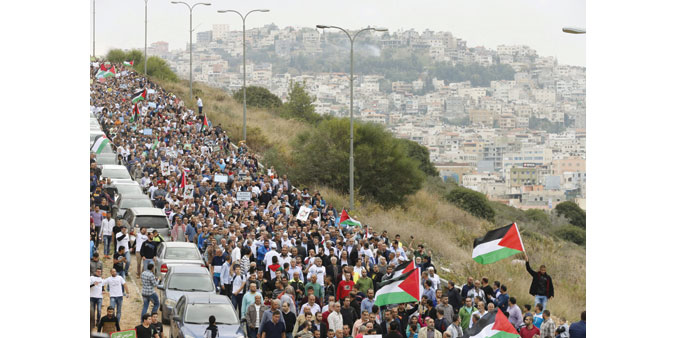Israeli Arabs shout slogans during a demonstration against the outlawing of the Islamic Movement’s northern branch, in the northern Israeli-Arab town of Umm al-Fahm yesterday.
Arab Israelis march to protest against the decision to ban the northern wing of the Islamic Movement, with its leader denouncing the Jewish state
Agencies
Umm al-Fahm
Thousands of Israeli Arabs protested yesterday against the outlawing of a popular Islamist group that Israel says has played a central role in stoking a wave of Palestinian street attacks.
Under a sea of Palestinian flags, the protesters chanted “We are not terrorists” and “We are stronger than the ban”.
Israel’s government banned the Islamic Movement’s northern branch on November 17, risking an angry backlash by its largely quiescent 20% Arab minority.
At yesterday’s protest in Umm al-Fahm, about 60km north of Tel Aviv, its leader denounced what he called Israeli “terrorism” in an address to the crowd.
“Who are the terrorists? This is racism by Israel, which closed the associations that were helping 23,000 orphans now left to go hungry,” said Raed Salah.
“You outlawed the Islamic Movement to scare us, but today it is the Palestinian people who are courageously saying ‘No’ to Israel’s racism.”
Since it was founded in the early 1970s, the Islamic Movement has developed a network of religious, sports and educational associations, a model that spread across the Arab world.
Today, Salah said, these associations provide services to half a million Arab Israelis from a population of 1.4mn.
The movement says that these are the services that Israel should provide.
Salah was recently sentenced to 11 months in prison for having called in 2007 “every Arab and Muslim to help the Palestinians and to launch an Islamic Intifada”.
Police did not say how many people attended the protest. A photographer said there were about 15,000 demonstrators in what was one of the largest Arab rallies in Israel in recent years.
The Islamic Movement’s northern branch does not, unlike its southern counterpart, recognise Israel’s legitimacy. It has been at the forefront of protests against government policies toward Israeli Arabs and the Palestinians.
The group says its activities are lawful.
But Israel says the movement has encouraged Palestinian assaults on Israelis by falsely accusing the government of trying to erode Muslim control of Jerusalem’s Al Aqsa mosque complex, Islam’s third holiest site which is also sacred in Judaism.
Protesters marched through the town’s streets chanting: “With our spirit and blood we shall redeem you, Al Aqsa.”
Almost daily Palestinian stabbings, car rammings and shootings have killed 19 Israelis and one US citizen since October 1.
Israeli forces have killed 93 Palestinians, some of whom were carrying out assaults and others in clashes with police and troops. Many of those killed have been teenagers.
The Palestinian attacks have been triggered in part by what the Palestinians fear are Israel’s attempts to change a decades-old religious status quo at the Al Aqsa compound, known to Muslims as the Noble Sanctuary and to Jews as Temple Mount.
Israel says it has no intention of changing arrangements at the complex, at which non-Muslim prayer is banned. However, an increase in visits by religious Jewish activists and far-right lawmakers has added to Palestinian suspicions.
Israeli Arabs are descendants of residents who stayed put during the 1948 war of Israel’s founding, in which hundreds of thousands of fellow Palestinians fled or were forced to leave their homes.
Though they have equal rights, Israeli Arabs often say they are treated as second-class citizens, citing inferior services and unfair allocations for education, health and housing. More than half live below the poverty line.

